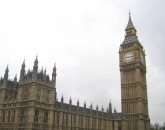
There is what to many will look like a contradiction at the heart of the Bank of England's voluminous pronouncements on inflation and interest rates. On the one hand it expects price changes to be zero or even negative - or well below the 2% target - for longer than it predicted back in May (and actually nought over the next couple of months).
But the Bank also expects inflation to return to target on the basis of interest rates that could rise a bit faster next year than it had been anticipating.
That said, don't panic if you have a mortgage - the Bank's forecasts are based on the assumption that the interest rate it controls, Bank Rate, will rise just 0.25% in the first four months of next year and could double from 0.5% to 1% by the end of 2016.
So if banks and building societies simply pass on this increase in their borrowing costs to customers, mortgage rates would rise by 0.5% next year.
But if inflation is too low, why on earth would accelerated rises in interest rates do anything but reinforce the stagnation or even fall in prices?
It's because the Bank of England reckons that what is bearing down on inflation is temporary in nature, and is foreign in origin. Or to tell you what you know, the big deflationary influences are the collapse in oil prices and the softness of food prices.
A few months ago, it looked as though we were through the downward phase of the energy price cycle. But there has been another lurch downward in the oil price in recent weeks.
And a 3.5% increase in the price of sterling relative to other currencies since May - which makes imports cheaper - means inflation could turn to deflation again in the next couple of months (though not growth-destroying, toxic deflation - or at least not yet).
By contrast, wage rises are now accelerating (yes, yes – about time too). And although there is no sign yet that companies are passing on those wage increments in the form of sharply higher prices for their goods and services, the Bank believes wage growth will start to push inflation back to target by the end of the year.
In fact one member of the Bank's Monetary Policy Committee, Ian McCafferty, last month voted for an increase in the interest rate of 0.25% , because of "his view that demand growth and wage pressures were likely to be greater, and the margin of spare capacity smaller, than embodied in the Committee's collective August projection".
And here lies the central uncertainty for the Bank of England about the British economy: whether a recent faint rise in unemployment represents a serious weakening in the economy, or skills shortages.
For what it's worth, businesses are telling surveys that they still have considerable appetite to hire. That implies they can't get the people with the abilities they need - and that they will have to start to pay more for growth.
So the notion - implied by the Bank of England's pronouncements - of interest rates being set to rise at a time when employment has stopped growing may be a painful one, but perhaps not bonkers.
Pages
Click here to see the published article.











